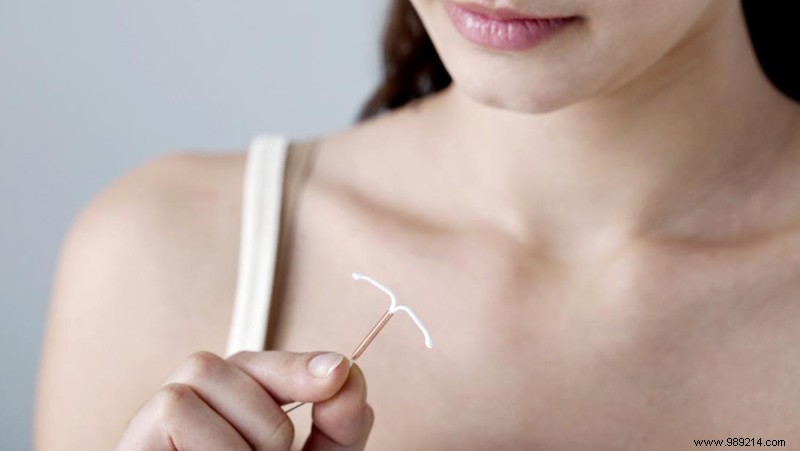
Contraception ? Vast subject, which, for women in general, is one that is often talked about at a very young age, ideally in early adolescence, where the first sexual relations are more likely to happen. Even if it is very important to talk about it and to learn about the subject in order to avoid unexpected surprises, contraception can quickly, wrongly, become taboo or appear as a message poorly disseminated to women (or men too!), and become a real headache! Among all the contraceptive methods on the market, it is very useful to know which ones are made and how to use them in order to know what we are getting into, and which ones suit us best.
Contents 1 Contraception:let’s talk about it first! 2 The so-called "hormonal" contraceptive methods:the most widespread and used 2.1 The pill 2.2 The contraceptive implant 2.3 The intrauterine device or intrauterine device 2.4 The contraceptive patch 2.5 The vaginal ring 2.6 Injectable contraceptives 3 The so-called "barrier" contraceptive methods 3.1 Condoms (male and female):double protection for proven effectiveness! 3.2 Cervical cap or diaphragm 4 Contraceptive methods without hormones 4.1 The copper IUD 4.2 Sterilization 4.3 What method of contraception have you opted for?Focus on these methods of contraception that make life hard for us...or not!
To have children or not, that is not the question. It is also important to protect yourself against so-called "surprise" pregnancies, as it is useful to protect yourself against STDs. Contraception (any type) is the temporary, long-term, or permanent use of a method to prevent unwanted pregnancy. There are many birth control methods on the market today. We will try to decipher the workings of it in order to best target what might suit you.
Among these are:The pill, the implant, the hormonal intrauterine system (IUS), the patch, the vaginal ring as well as the various injectable contraceptives.
These methods contain either a combination of estrogens and progestins or progestogen alone. Their mode of action is mainly based on blocking ovulation. They also modify the cervical mucus, which prevents sperm from crossing the cervix and thus avoiding a surprise pregnancy.
Note that all these methods are 99.9% reliable, and that a dosage error or an oversight, or a significant change in your hormones can lead to a total cancellation of the effectiveness of these means.
Used by more than one in five women, the pill is the method of contraception most recommended by medical specialists, because it is the most practical and the best known. Hindsight on this method provides real protection.
The pill comes in the form of tablets containing hormones:either a combination of estrogen and progestogen (="combined" pills) or progestogen alone (="microprogestogen" pills).
Its use? Depending on the pills:once a day, daily or 21-24 days a month.
Its theoretical effectiveness is proven at 99.9%.
For women who don't forget anything!
This implant is represented in the form of a small rod inserted into the arm by a health professional, continuously releasing hormones identical to those of a progestogen pill.
Its use ? painlessly it is implanted in the patient's arm once and lasts for almost three years.
Its effectiveness is proven to be 99.9%.
For long term peace of mind!
The IUD is a plastic device (different from copper), T-shaped, containing hormones. It is inserted into the uterine cavity by a healthcare professional.
How to use it? It is inserted into the uterine cavity only once and its duration is between 3 and 5 years.
Long-lasting protection with proven 99.9% effectiveness.
Identical to an anti-tobacco patch, the contraceptive patch is a patch that sticks to the skin. It delivers a combination of hormones identical to that of a combined pill (estrogen and progestogen) that enter the blood through the skin.
Its first weak point is that of being quite conspicuous, during your swimming pool or beach outings. However, it is practical since it does not come off as a result of friction or in contact with water. It's also up to you to see where you prefer to stick it, according to your habits!
The patch is often prescribed to women who can't stand taking pills (headaches or stomachaches):it's a good compromise!
Its use? 1 time per week (for 3 weeks then withdraw 1 week).
99.9% reliable!
Small flexible porous plastic hormonal ring that contains a combination of hormones (estrogen and progestogen) that the woman introduces herself deep into the vagina.
Its weak point? To insert yourself, so possibility of being wrong about the position of the ring or of being slightly injured. Reliability is therefore reduced!
Its use? Once a month (leave it in place for 3 weeks then remove it for 1 week).
99.7% proven effectiveness.
They are composed of a contraceptive hormone (synthetic progestogen) injected intramuscularly. The dose is to be injected by a healthcare professional every three months.
Very uncommon, the effectiveness of this method is proven to be 99.7%, and can prove to be an excellent compromise against other unsuccessful methods!
Proven and effective methods, these contraceptives work by preventing sperm from entering the uterus. It is advisable to combine spermicides when using a diaphragm or cervical cap.
Only condoms (male and female) effectively protect against sexually transmitted infections (STIs).
Condoms (male and female), the diaphragm and the cervical cap are so-called “barrier” methods.
Latex or polyurethane protection or nitrile or polyurethane sheath that prevents the passage of sperm (and sexually transmitted diseases) into the vagina.
Their use ? For men or women, it is essential to use it every time you have sex.
Reliable between 95% and 97% but very useful compared to other contraceptive methods to also avoid STDs and STIs (sexually transmitted diseases or infections).
Protections (in latex or silicone) that are inserted into the vagina and cover the cervix preventing the passage of spermatozoa.
To be used in combination with spermicides for greater effectiveness.
Their use? Every time you have sex. They can be put on a few hours before intercourse and should be left in place for 8 hours after intercourse.
Their effectiveness is proven between 91 and 94%.
Hormone-free contraceptive methods include “barrier” contraceptive methods, the copper IUD, and sterilization.
The so-called “barrier” methods work by preventing sperm from entering the uterus, while the copper IUD prevents fertilization of the egg by altering the sperm.
Sterilization is a permanent and generally irreversible method involving surgery on the male or female genitalia.

The copper intrauterine device, better known as the IUD, is a plastic device, often T-shaped, partially covered with copper. It is inserted into the uterine cavity by a healthcare professional and lasts, once inserted, between 5 and 10 years.
It is advisable to use this method when the woman has already conceived children. For a woman who has not yet had a pregnancy, it is advisable to use the plastic IUD.
The copper one is 99.9% reliable.
Surgical intervention for contraceptive purposes:vasectomy (=section or obstruction of the ducts that transport sperm) for men, tubal ligation or obstruction for women.
This method is irreversible in both cases. An act, therefore, definitive, which it is better to think about before starting!
99.9% reliable! Even final, this operation can (in rare cases) have misses!
To conclude…
Do you need regular birth control but you don't know where to turn? This latest information can help you choose the method of contraception that seems best suited to your lifestyle and your needs. In the case of remaining doubts, and if you do not know which method to turn to, do not hesitate to consult a specialized health professional who will be able to guide and advise you best!
****
